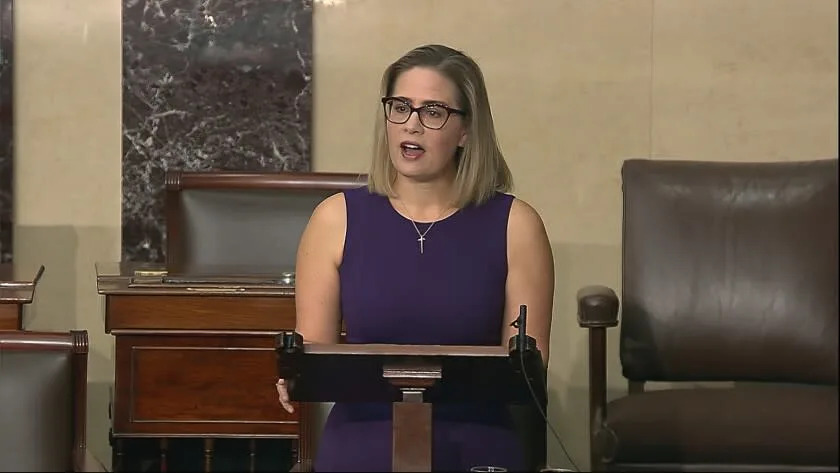Los Angeles Times
Op-Ed: Arizonans need Kyrsten Sinema to stand up for their voting rights

A little over a year ago, a violent insurrection, fueled by disinformation and hate, threatened to destroy our fragile democracy. Soon, our lawmakers may finish what the insurrectionists began if they cannot find a way forward on common-sense federal voting rights legislation.
The 2020 census made clear that America is at a demographic tipping point, and standing in the way of securing our democracy is a dysfunctional Senate that has failed to effectively govern for a generation. Even as we celebrate Martin Luther King Jr. — who was hated, brutalized and assassinated for his efforts to expand the vote — senators are faced with a critical decision that will determine the future of America and our standing as a representative democracy.
Republican senators are now set to use the filibuster to block the Freedom to Vote Act and the John Lewis Voting Rights Advancement Act, which would protect voting rights for all Americans. Yet two Democrats, Arizona Sen. Kyrsten Sinema, along with West Virginia Sen. Joe Manchin, are refusing to put us on the road to progress by changing Senate rules to pass the legislation.
Since the Supreme Court’s 2013 Shelby County vs. Holder decision, which gutted a core provision of the 1965 Voting Rights Act, an avalanche of voter suppression tactics from closing polling places to purging voter rolls to passing restrictive voter ID laws have been employed across the country. In the face of unprecedented voter turnout amid a global pandemic, 49 state legislatures introduced 440 pieces of legislation in 2021 that sought to limit access to the ballot box. This year isn’t shaping up to be much better, with 152 billed carried over into 2022 legislative sessions and 72 bills pre-filed last month.
When it comes to anti-voter legislation, Arizona takes the cake for most creative. State lawmakers have passed bills — fueled by the big lie that the 2020 presidential election was stolen — that discourage voting through various tactics, including expanding voter roll purges and making it harder for voters to fix a mail-in ballot. Some of their most audacious ideas were not signed into law last year, like Arizona House Bill 2720, which sought to allow lawmakers to overrule the state’s popular election results and choose its own slate of presidential electors, and House Bill 2792, which would have made it a felony for an election official to send a voter an early ballot unless that voter requested it.
The partisan nature of these efforts coupled with the increasing importance of voters of color, who lean Democrat, cannot be understated. But Sinema — who represents a state with a growing population of Latinos that helped to elect her in 2018 and to flip Arizona blue in 2020 — is refusing to take action that would not only support her reelection but would strengthen our democracy, starting with her home state.
Sinema said that her refusal to end the filibuster, even for the voting rights legislation, is in the name of democracy and an effort to reduce division. The reality is that her unwillingness to unite with her own party is holding back voting rights and election integrity practices that voters broadly support. Unfortunately, her inaction allows the will of a minority of the population to have an outsized influence on who can participate in our democracy.
We are facing an all-out assault on free and fair elections that coincides with the growth and consequence of voters of color. Communities that have historically been disenfranchised by poll taxes, vote dilution and voter identification laws are being left behind in the face of intersecting crises, including COVID-19, income inequality and climate change.
The 2020 census, flawed as it was, showed that these communities are the future of not only Arizona, but of all of America. The census found that while the country’s white population is declining, Latinos and Asian Americans — both youthful populations — are growing, driving a significant shift in the under-18 population. America’s future prosperity depends upon the very populations that far too many lawmakers are trying to cut out of our democracy. Sinema has a role to play in giving equal political voice to all Americans, not a minority of lawmakers who defy their constituents and subvert the U.S. Constitution.
Nearly 60 years ago, members of Congress put the will of the people first and answered a call to take courageous action to pass the 1965 Voting Rights Act. They did so in a nation at a crossroads with race, war and inequality. Congress went on to reauthorize that law five times, the last time in 2006. Each time, it acted to expand access to the ballot and take a step to fortify our democracy. Now, Sinema faces the same choice. She, too, has the power to take decisive action that puts Arizonians and the American people first. The question is, will she act?
Sonja Diaz is a civil rights attorney and the founding director of the UCLA Latino Policy and Politics Initiative.
